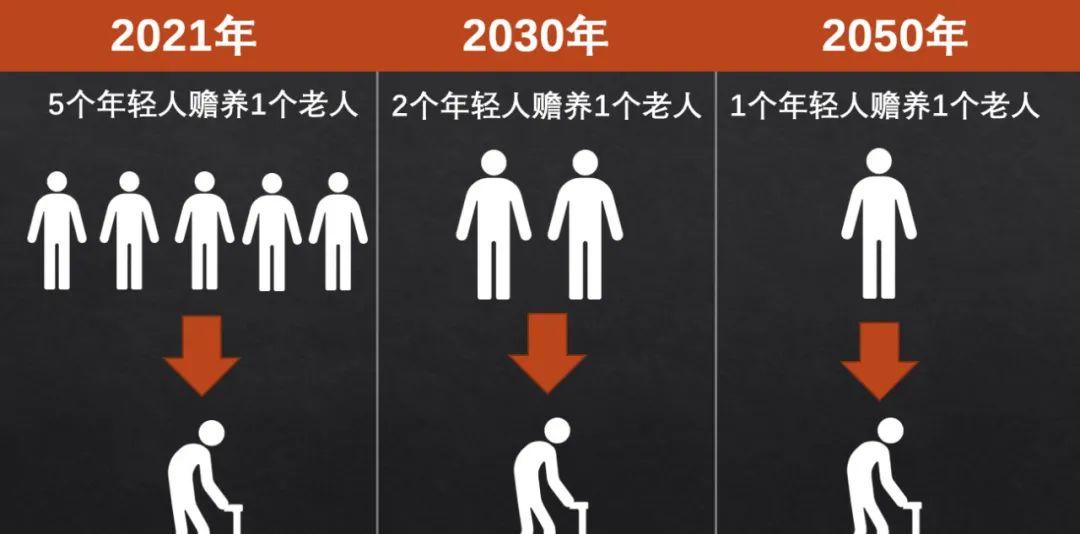In 2021, 5 people raise an elderly person;
In 2030, 2 people raise an old man;
In 2050, 1 person will have to raise an old man!

Yes, you read that right, that's what's happening before us.
The pressure of old-age care has been placed in front of each and every one of us, especially young people.
Whether the public likes to accept it or not, the twin crises of ageing and low birthrate are now approaching each of us almost irreversibly.
According to the "China Statistical Yearbook 2021", the national population birth rate in 2020 was 8.52 ‰, falling below 1% for the first time, setting a new low in 43 years since 1978!
"Aging" meets "low birthrate" is undoubtedly a "time bomb" hidden in the mainland's economic development. What is the future of the pension situation? Who pays for the pension, who contributes to the pension?
The size of the family is no longer increasing, and it is not feasible to raise children and prevent the elderly
According to the traditional thinking of Chinese, there is no doubt that the family pension - children pay, children contribute. However, it is not known that with the change of society, more and more people's families are gradually single, and their dependence on the family for survival is also decreasing. According to data released by the Civil Affairs Bureau, the current single adult population in the mainland has reached 240 million, of which 77 million adults live alone, and it is expected that by the end of 2021, this number will climb to 92 million.
According to the latest data, the average household population on the mainland is currently 2.6, down 0.5 from 3.1 in the sixth national census in 2010. There is no doubt that the smaller size of the family will also limit the space for family members to help each other for the elderly, which shows that the idea of "children's pension" can no longer adapt to the current social development.
Social change, more than 60% of first-tier and new first-tier cities have entered "deep aging"
In the yangtze river delta region, which is more economically developed, the degree of low births and aging is more serious. According to the data in 2019, nearly 60% of the first-tier and new first-tier cities on the mainland have entered the "deep aging" stage, of which Shanghai is the most serious, and the proportion of the population over 60 years old is as high as 35.2%.
During the same period, the national average elderly population dependency ratio was 17.8%, and the dependency ratio of the elderly population in some provinces with large populations, such as Shandong, Sichuan, Chongqing and other places, exceeded 20%. This means that for every 5 laborers in these areas, they need to bear 1 elderly population.
What is more worrying is that the current fertility rate is decreasing, and when this group of laborers grows old, who can be responsible for their pension. In addition, due to the increase in social population mobility, the previous situation of "three generations living together" has been broken, and a large number of children will not choose to live with their parents, which adds another layer of test to the social pension.
The number of migrant workers is close to 300 million, and nearly a quarter is about to enter old age
As a labor power, the pension problem of the vast number of migrant workers on the mainland cannot be ignored.
According to the "2019 Migrant Worker Monitoring and Survey Report" previously released by the National Bureau of Statistics, the total number of migrant workers in China reached 290.77 million, an increase of 2.41 million over 2018, an increase rate of 0.84%, of which 24.6% were over 50 years old, and the proportion of young people aged 21 to 30 for the first time exceeded (23.1%).
In other words, nearly a quarter of the country's nearly 300 million migrant workers have reached the age of 50, which is only 10 years since they have entered the real aging.
So in the face of the double crisis of aging and low births, can we really only sit still and wait, and there is no measure to save it? The answer, however, is not entirely true.
First of all, in recent years, in order to promote the marriage rate and the increase of fertility rate, the state has not only given subsidies in medical education, housing and other aspects, but also opened up the three-child policy, implemented a number of welfare openings such as free marriage examination and free pregnancy examination, and solved the worries of the majority of young people.
Secondly, for the elderly whose children are not well cared for or who have no one to support them, the government has further increased the pace of construction of village and town nursing homes and urban nursing homes, as well as the excavation and exploration of new pension models such as community pension, pastoral pension, and group pension. These will greatly reduce the pressure of the elderly in the Chinese, improve the happiness index of the elderly, and strive to achieve "no children, but also to prevent aging" as soon as possible.
Finally, in the 21st century, with the rapid development of science and technology, artificial intelligence will be the most practical method of elderly care in the future. All parts of the country are making every effort to create a new pattern of intelligent old-age care, provide services for the elderly through high-tech, improve the quality of life of the elderly in their later years, and solve the problems of old-age care and nursing for the disabled elderly to the greatest extent.
Disclaimer: The material of this article comes from the Internet, such as copyright and other issues, please contact us in time to delete!